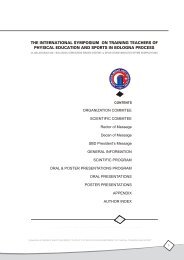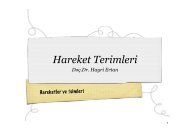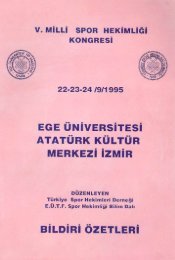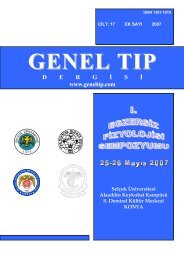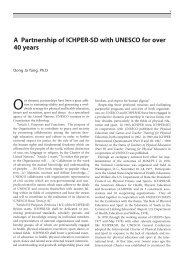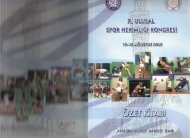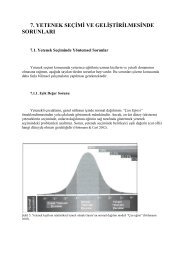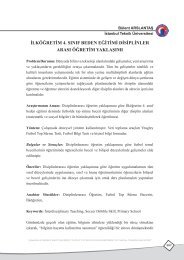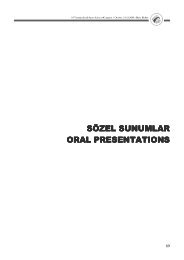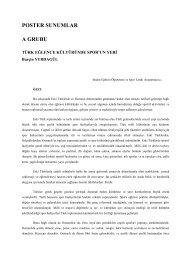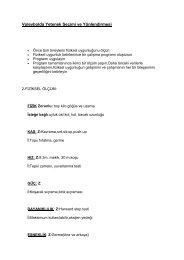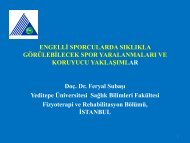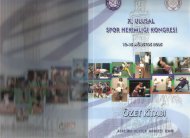KARDÄ°YORESPÄ°RATUVAR EGZERSÄ°Z TESTLERÄ° ... - Spor Bilim
KARDÄ°YORESPÄ°RATUVAR EGZERSÄ°Z TESTLERÄ° ... - Spor Bilim
KARDÄ°YORESPÄ°RATUVAR EGZERSÄ°Z TESTLERÄ° ... - Spor Bilim
Create successful ePaper yourself
Turn your PDF publications into a flip-book with our unique Google optimized e-Paper software.
7.ULUSLARARASI SPOR BİLİMLERİ KONGRESİ27-29 EKİM 2002KONGRE - PANELLERTHE NEED FOR INSTITUTIONALIZED SYNERGYFOR THE EDUCATION OF THE WHOLE PERSON IN THE 21 STCENTURYDong Ja Yang, Ph.D.Secretary General, ICHPERSDProfessor, Howard University, Washington, D. C.at the 7 th International <strong>Spor</strong>ts Sciences Congress of theTurkish <strong>Spor</strong>ts Science AssociationAntalya, TurkeyOctober 26 – 29, 2002INTRODUCTIONThe topic, "The Need of Institutionalized Synergy for the Education of the Whole Person in the 21 stCentury" is a call for every nation and every human institution to revitalize and re-enforce curricula andprogressive programs to facilitate an absolute essence of education, that is to educate the whole person – as anintegrated and balanced individual – the mentally, morally, and physically educated person. Throughout thehistory of humanity, across the cultural diversity, the balanced education of the whole child or person in theinterrelated and indivisible domains of mental, moral, and physical education has been the accepted goal. Overtime, this paradigm has been continuously redefined, modified, or reinterpreted through the social andeducational reform processes of the last several decades.As revealed in the interdisciplinary nature of physical education in the 10 main topics and their subtopicsof this congress, physical education embraces health and includes all aspects of movement relatededucation such as play, games, recreation, sports, dance, all of which are indivisibly associated with theaffective, cognitive and psychomotor domains. The affective domain of physical education consists of all thefeelings and emotions associated with movement-related experiences. The high level of aesthetic valuesperceived to be gained through performance, from childhood throughout the ageing process, in games, sports,recreation, and dance have caused people to construct a new definition of physical education as “the art andscience of human movement”. The cognitive domain deals with the processes of analysis, formulation,conceptualization, synthesis, imagery rehearsal, and utilization of various aspects of movement. The subjectmatter of this domain is the structural, mechanical, spatial, temporal, and rhythmic dimensions of movement(Burton, 1977). Every human movement in physical education is a purposeful and goal-directed effort madethrough the cognitive processes. To play and perform while thinking and feeling has been identified as acommon attribute and factor of all outstanding players, and athletes pervasively in all age groups. Thepsychomotor domain refers to all learning experiences designed to improve the quality of movement responses(Burton, 1977). The pattern of psychomotor skill development encompasses a reflective behavior, locomotorsmovements, basic manipulative movements, fundamental movements, refinement of fundamental movements,play and games, movement-related recreational activities, specific sports and dance, gymnastics, aquatics, andspecialized skill development.Page 2. / VII. International <strong>Spor</strong>ts Sciences CongressThe domain of physical education begins the moment a human becomes capable of movement andcontinues as long as they live. Every child is a moving and dynamic organism that is thinking and feeling,changing, growing and developing, exploring and evaluating, selecting and rejecting from the surroundingenvironment. Children learn to move and move to learn.The International Charter of Physical Education and <strong>Spor</strong>t adopted in 1978 by the United NationsEducational, Scientific, and Cultural Organization (UNESCO) stated guiding principles, values and anassessment of physical education and sport. The three most critical elements of the Charter in my opinion were:(a) the practice of physical education and sport is a fundamental right for all; (b) physical education and sport312



